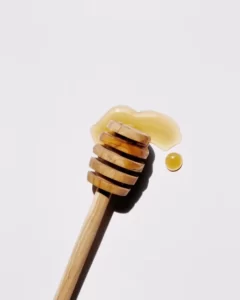Table of Contents
Manuka Honey vs Sugar
Introduction
The crystallization of honey is a natural process that occurs over time and does not indicate adulteration or spoilage. Pure, raw, and unheated honey has a tendency to crystallize, which actually preserves its flavor and quality characteristics. In fact, many honey users prefer partially or fully-crystallized honey as it is easier to spread and has a richer taste. The size and texture of honey crystals can vary, with finer textures resulting from rapid crystallization. Additionally, crystallized honey tends to have a lighter color than liquid honey, as glucose crystals are naturally white. This article will explore the reasons behind honey crystallization and how it differs from sugar.
Why Does Honey Crystallize?
Honey is a highly concentrated sugar solution, with more than 70% sugars and less than 20% water content. This high sugar concentration makes honey an over-saturated solution, making it prone to crystallization. The two principal sugars in honey are fructose and glucose, and their relative amounts vary in different types of honey. Generally, fructose accounts for 30-44% of honey’s sugar content, while glucose ranges from 25-40%.
The balance between fructose and glucose in honey determines its crystallization rate. Glucose has a lower solubility in water compared to fructose, which means it is more likely to crystallize. As the glucose crystals form, they separate from the water and spread throughout the honey solution. Over time, the honey becomes thick and crystallized.
Crystallization Process
When honey crystallizes, the glucose separates from water and takes the form of tiny crystals. As more glucose crystallizes, these crystals disperse throughout the honey, leading to a stable saturated form. The crystallization process is influenced by various factors such as temperature, honey composition, and storage conditions. For example, colder temperatures accelerate crystallization, while higher fructose content can slow down the process.
Differences Between Manuka Honey and Sugar
While honey and sugar are both sweeteners, they have distinct characteristics and nutritional profiles. Manuka honey, in particular, has gained popularity for its unique properties and potential health benefits. Here are some key differences between Manuka honey and sugar:
-
Composition: Manuka honey contains more than just sugars. It also contains enzymes, antioxidants, vitamins, and minerals, which contribute to its overall nutritional value. On the other hand, sugar is solely composed of carbohydrates and lacks these additional nutrients.
-
Glycemic Index: The glycemic index (GI) measures how quickly a food raises blood sugar levels. Manuka honey has a lower GI compared to white sugar, meaning it causes a slower and more gradual increase in blood sugar. This can be beneficial for managing blood sugar levels and reducing the risk of diabetes.
-
Antibacterial Properties: Manuka honey is known for its potent antibacterial properties, attributed to its high levels of methylglyoxal (MGO). These antibacterial properties are not found in sugar, making Manuka honey a healthier choice in terms of supporting immune health and fighting infections.
-
Flavor and Texture: Manuka honey has a distinct flavor profile, characterized by its earthy, floral, and slightly bitter taste. It also has a thicker consistency compared to liquid sugar. Sugar, on the other hand, has a neutral taste and a fine texture.
-
Processing: Manuka honey is typically raw and unprocessed, meaning it retains its natural properties and nutrients. In contrast, sugar undergoes extensive processing, including refining and bleaching, which strips it of any beneficial components.
Conclusion
In conclusion, honey crystallization is a natural process that occurs due to the high sugar content of honey. It does not indicate spoilage or adulteration and can even enhance the flavor and texture of honey. Manuka honey, in particular, offers unique advantages over sugar, such as additional nutrients, lower glycemic index, antibacterial properties, distinct flavor and texture, and minimal processing. Incorporating Manuka honey into your diet can provide both sweetness and potential health benefits. For more information about Manuka honey and its uses, visit https://aboutmanukahoney.com.
References:



